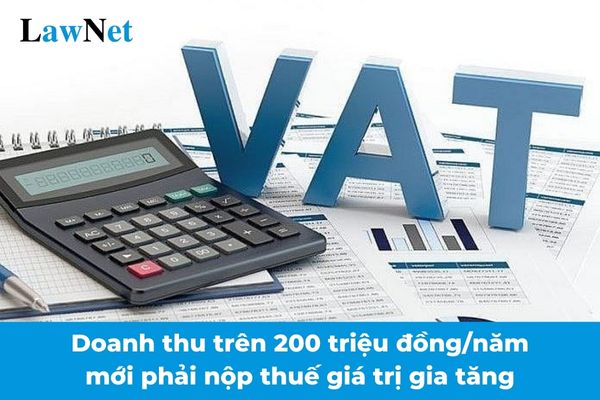As of January 1, 2026, shall only revenue over 200 million VND/year be subject to value-added tax in Vietnam?
As of January 1, 2026, shall only revenue over 200 million VND/year be subject to value-added tax in Vietnam?
According to Clause 25, Article 5 of the Value-Added Tax Law 2024 (effective from July 1, 2025) which regulates entities that are not subject to VAT as follows:
Entities not subject to tax
...
- Goods and services of households and individual businesses with an annual revenue of 200 million VND or less; assets of organizations and individuals not in business, not VAT payers when sold; national reserves sold by national reserve agencies; fees and charges as prescribed by the law on fees and charges.
...
Furthermore, according to Clause 2, Article 18 of the Value-Added Tax Law 2024 (effective from July 1, 2025) regarding the effective date of the Value-Added Tax Law 2024, it is stipulated as follows:
Effective date
...
- The regulation on the revenue threshold of households and individual businesses that are not subject to tax in Clause 25, Article 5 of this Law and Article 17 of this Law is effective from January 1, 2026.
...
Thus, starting from January 1, 2026, households and individual businesses with revenue over 200 million VND/year must pay value-added tax.

As of January 1, 2026, shall only revenue over 200 million VND/year be subject to value-added tax in Vietnam? (Image from the Internet)
What is the basis for calculating VAT for individual businesses in Vietnam?
According to Article 10 of Circular 40/2021/TT-BTC which regulates the basis for calculating VAT for individual businesses as follows:
The tax calculation basis for household businesses and individual businesses is the taxable revenue and the tax rate applied to the revenue.
(1) Taxable Revenue
The taxable revenue for VAT concerning individual businesses is the revenue including tax (for cases subject to tax) from all sales, outsourcing fees, commissions, and service provision generated during the tax period from activities of production, business of goods, services, including bonuses, support for achieving sales, promotions, commercial discounts, payment discounts, financial aid in cash or in-kind; subsidies, surcharges, extra fees, additional fees received as per regulations; compensation for contract breaches or other compensations (only counted towards taxable personal income revenue); other revenue received by the individual business, regardless of whether the payment has been received or not.
(2) Tax Rate on Revenue
- The tax rate on revenue includes the specific VAT rate applied to each field, industry as guided in Appendix 1 issued with Circular 40/2021/TT-BTC.
- If an individual business operates in multiple sectors, the individual business must declare and calculate taxes according to the tax rate applied to each field. If the individual business cannot determine the taxable revenue for each field, sector, or determines it incorrectly compared to reality, the tax authority will assess the taxable revenue for each field, sector as prescribed by the law on tax management.
What are regulations on tax calculation method for individual businesses paying VAT under the declaration method in Vietnam?
According to Article 5 of Circular 40/2021/TT-BTC which regulates the tax calculation method for individual businesses paying VAT under the declaration method as follows:
- The declaration method applies to large-scale individual businesses; and individual businesses not meeting large-scale criteria but opting to pay taxes under the declaration method.
- Individual businesses paying taxes under the declaration method declare taxes monthly unless they are new in business or meet criteria to declare taxes quarterly and choose to declare taxes quarterly as prescribed in Article 9 of Decree 126/2020/ND-CP.
- If an individual business paying taxes under the declaration method determines taxable revenue that does not match reality, the tax authority will assess taxable revenue as prescribed in Article 50 of the Tax Administration Law 2019.
- Individual businesses paying taxes under the declaration method must implement accounting policies, invoices, and documents. If the individual business operates in fields or industries where revenue can be determined based on confirmation from competent authorities, they are not required to implement accounting policies.
- Individual businesses paying taxes under the declaration method are not required to finalize tax.

